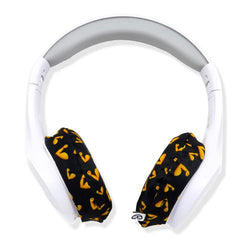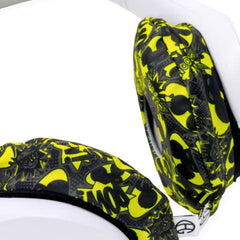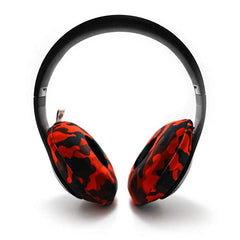Winter Workouts: 5 Reasons to Exercise Outside in Cold Weather

Exercising outside in the cold weather may seem counterintuitive to those of us used to temperature controlled gyms but the winter is THE ideal time to take your workout outdoors.
Over the summer, we posted our tips on exercising in the hot weather and we’re definitely missing the heat and the summer sunshine BUT there’s just something about the crisp mornings, about pulling in lungfuls of sharp fresh air, that can make you feel truly alive. It’ll probably have you coughing into your buff, too, but what’s not to love!?
Different seasons present different difficulties or reasons to change-up training routines. It’s an opportunity to assess what’s working for you and what’s not. The gym is still going to be there next week, and it’s absolutely worth heading out under the open sky to get your workout in because it offers a number of benefits that you’re not going to get if you stay indoors. For one thing, there’s no humidity to worry about. The winter makes it somewhat easier to manage your fluid levels, too, and whilst sweating is a pretty awesome function of the body - it’s rarely pleasant in the burning sunshine. The winter is also a good time to upgrade your wardrobe. Fitness fashion has come a long way, too, and much of what is on offer is both functional and fashionable. The downside to exercising outdoors in winter is that our motivation can take a hit. It’s colder and it’s often darker and in some parts of the world, it can be dangerous if the temperature drops too low. There are some good tips on running in the cold weather on the Runners World Website. Research suggests, too, that the sooner you start getting outdoors and exercising in the colder weather, the sooner you’ll acclimatise to it. So better crack on, yeah?
If you do prefer getting hot indoors rather than going outside, then don’t forget to check out sweat crawls which are coming to the UK this autumn from the US.

1. You’ll Burn More Calories
The body has to work harder in the cold weather. Your metabolism steps up a gear and burns more calories. If that isn’t an incentive to get outside this winter, then we don’t know what is. Interestingly, too, a study published in Medicine & Science in Sports & Exercise found that race times were quicker during the colder months.
Full disclosure: the calories burned aren’t huge in number nor will you suddenly notice a dramatic difference in your body composition just because you hit the running track in sub-zero temperatures BUT every little helps, right? The reason why calorie burn in cold weather isn’t as dramatic as you might read in other places is explained really well in an article written by Julia Belluz on the Vox website. The short of it is that we do burn more calories when we shiver to stay warm and in the cold weather the body can start to burn ‘brown fat’ the main function of which is ‘heat production’.
Hoorah! Yes?
Well, Belluz explains that both these things use energy and both, therefore, burn calories. Unfortunately, once we start exercising and warming up, we may end up generating enough heat that our bodies no longer need to shiver or burn brown fat and therefore, the additional calorie burn stops. Which is a little anti-climatic especially as so many articles trumpet this point without explaining its obvious limitations. BUT it’s not a lie and technically you will burn more calories - even if it’s only a few more - and that’s got to be worth holding onto when you’re crawling out from under your duvet to a frost-kissed morning.
Cold weather or not, you’re still going to sweat. If you’re heading out in your headphones, then remember to use Ear Hugs over the cushions to prevent moisture damage.
2. Get Some D
According to the NHS, most of us don’t get enough vitamin D between October and early March in the UK. Vitamin D is important for teeth, muscle and bone. Oily fish, red meat and eggs contain small amounts of vitamin D but the easiest way for our bodies to obtain it is from sunlight and in the winter, in this country, there’s simply not enough UVB light.
1 in 5 UK adults is believed to be deficient in vitamin D but there are a number of factors that dictate a person’s likelihood of deficiency: where they live in the UK, skin colour and crucially, the amount of time they spend outdoors. Research is starting to suggest that adequate Vitamin D levels may have to be administered via a supplement, but it’s certainly worth getting out in the air to boost your numbers even if it’s only by a small amount. You can’t get it through a window, either, so don’t think picking the treadmill with a view will be enough.

3. It’ll make you feel happier
There was an interesting discussion by Women’s Health about how the feel-good factor of exercise is amplified during the winter months. Kevin Plancher, M.D., head of Plancher Orthopaedics & Sports Medicine in New York City, told Women’s Health:
“All exercise can increase your levels of those feel-good hormones, endorphins, but because your body has to work harder in the cold, your endorphin production is boosted even more, leading to a happier state of mind."
Many of us would argue that exercise is always a mood booster but in the winter this can be even more apparent. Seasonal Affective Disorder (SAD) affects 1 in 3 people in the UK and although it isn’t entirely understood,there are symptoms that you may recognise from your own life: persistent low mood, irritability, lacking energy, craving carbohydrates etc.
Reduced exposure to sunlight is believed to be one of the major causes. Lifestyle measures such as exercising outdoors is one of the ways that the NHS recommends you combat SAD. Making a commitment to getting outside for even a short period can help massively in managing its symptoms. Even if you don’t suffer, we’re all prone to lethargy and low mood in the winter months and exercising outdoors in the fresh air is an easy way to manage your day-to-day mental health.
4. Boost Your Immune System
It’s tough getting through the colder months without catching a cold or whatever germ is circulating in your home or workplace. Exercise as an immune booster isn’t a new concept, and you’ve probably already realised how fitness can keep you healthy, but it’s worth reiterating over the winter months because if we aren’t working out, if we’re under the covers, in front of the fire, eating mac and cheese out of a bowl instead of hitting the gym, or going for that jog, then we're risking our health. During exercise, the body increases blood circulation which is key in getting white blood cells around the body. As we’re more likely to get ill in the colder months, keeping up with an exercise regimen will help our bodies fight off those winter nasties.
5. It’s Good for the Heart
A slight caveat here: it’s only good for the heart if you don’t have a heart problem. Speak to your GP if you have any concerns, but for many of us working out in the winter will strengthen our heart muscles. The cold weather will make our heart and respiratory systems work harder, explains Training specialist David Wiener to the Express:
“The colder conditions experienced over the winter season mean our body’s cardiovascular and respiratory systems will kick into a higher gear, and over time we become stronger and fitter because of it"

Exercising in the winter has many of the benefits of warm weather exercise, but the colder months can make our lives seem a little smaller, a little more isolated and more insular, and it’s important that we practice regular exercise to counteract the longer hours of darkness, the cold nights, the freezing mornings and the carousel of infections, viruses and colds that seem to plague some people each winter.
It’s worth remembering, too, that in winter our bodies encourage us to eat more. This is the season of Christmas and New Year. Throw in Thanksgiving if you live in the US, too. The festivities preach excessive eating and drinking. Anything we can do to keep in shape, to stay fit and healthy (whilst still allowing ourselves to enjoy food and drink), will keep us on track for a better, more rounded lifestyle and we won’t have to work so hard for those beach bodies come the summer.



